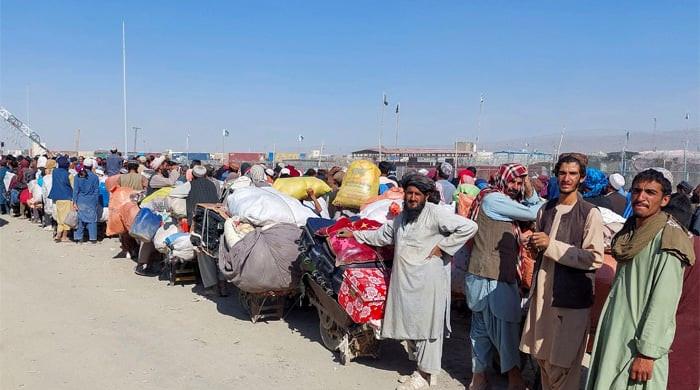Over 100,000 Afghans Depart Pakistan Amid Permit Cancellations
In the wake of the government’s declaration regarding widespread residence permit revocations, over 100,000 Afghan citizens have exited Pakistan during the past three weeks, as reported by the interior ministry on Tuesday.
The large-scale eviction initiative was put into effect by the Islamabad administration on April 1.
According to analysts, these expulsions are intended to exert pressure on Afghanistan’s Taliban government, which Islamabad holds accountable for contributing to an increase in cross-border assaults.
The interior ministry communicated that “100,529 Afghans have departed in April”.
Since the start of April, as the deadline to leave passed, groups of Afghan families have been observed en route to the border, crossing into a nation already struggling with a humanitarian crisis.
“I was born in Pakistan and have never been to Afghanistan,” expressed Allah Rahman, 27, at the Torkham border on Saturday.
“I feared potential mistreatment by the police towards my family and myself. We are now returning to Afghanistan out of utter desperation.”
Afghanistan’s Prime Minister Hasan Akhund voiced disapproval on Saturday regarding the “unilateral actions” implemented by the neighboring nation, following Foreign Minister Ishaq Dar’s visit to Kabul to discuss the returns.
Akhund appealed to the Pakistani government to “enable the dignified return of Afghan refugees”.
Reports have surfaced from some Afghans regarding weeks of random arrests and harassment, with many of those forcibly repatriated residing in Sindh and Punjab.
A considerable number of Afghans are choosing to leave willingly to avoid deportation. However, the UN refugee agency (UNHCR) noted that in April alone, the number of arrests and detentions in Pakistan (12,948) surpassed the total for the entire previous year.
Security forces are facing considerable strain along the Afghan border as they combat increasing insurgencies by ethnic nationalists in Balochistan, and by the Pakistani Taliban in the northwest.
The previous year saw the highest number of fatalities in the nation in the last ten years.
The government frequently accuses Afghan nationals of involvement in attacks and blames Kabul for providing refuge to militants on its territory – accusations that Taliban leaders deny.
Millions of Afghans have entered the country over the past decades, escaping ongoing conflicts, including hundreds of thousands since the Taliban’s return to power in 2021.
As security and economic challenges intensify, some Pakistanis have grown tired of hosting a large Afghan population, leading to widespread backing for the deportation campaign.
“They sought refuge here but ended up taking jobs and establishing businesses, taking opportunities from Pakistanis who are already struggling,” commented Tanveer Ahmad, a 41-year-old hairdresser.
According to the UNHCR, more than half of the deported Afghans were children.
The women and girls among those crossing are entering a nation where they face restrictions on education beyond secondary school and are excluded from numerous employment sectors.
During the initial phase of returns in 2023, several hundred thousand undocumented Afghans were compelled to cross the border within a few weeks.
In the second phase, unveiled in March, the administration revoked the residence permits of over 800,000 Afghans and cautioned thousands more awaiting relocation to other countries to depart by the close of April.



Comments (0)
No comments yet. Be the first to comment!
Leave a Comment